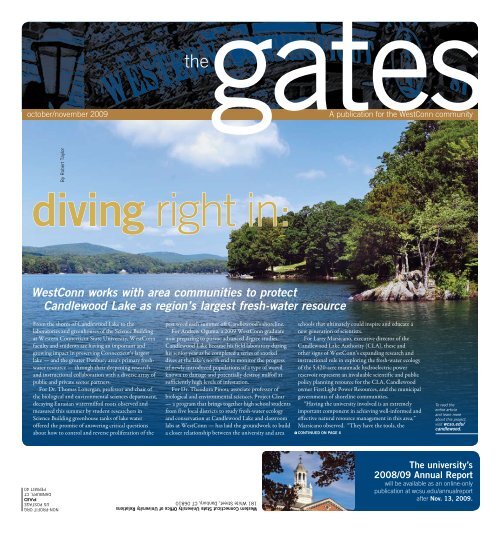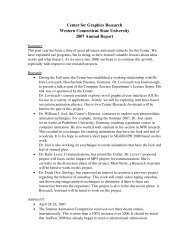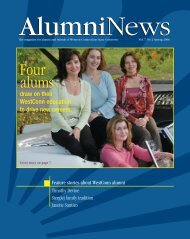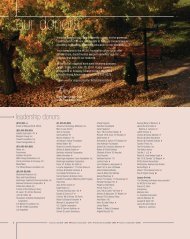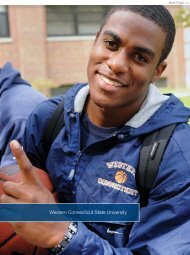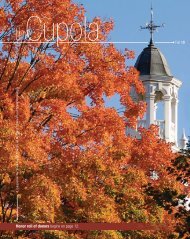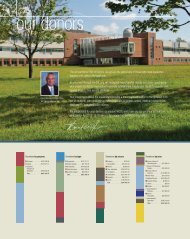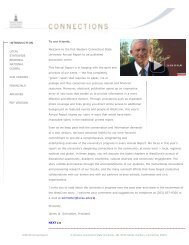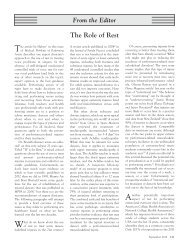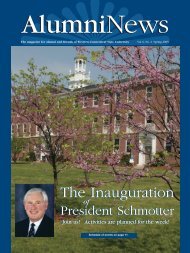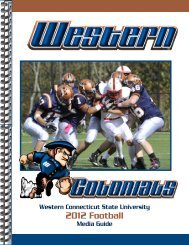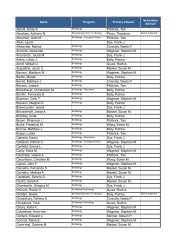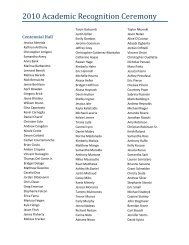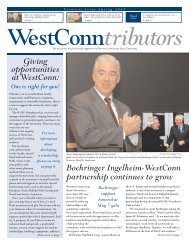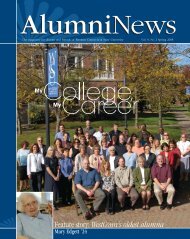October / November 2009 - Western Connecticut State University
October / November 2009 - Western Connecticut State University
October / November 2009 - Western Connecticut State University
You also want an ePaper? Increase the reach of your titles
YUMPU automatically turns print PDFs into web optimized ePapers that Google loves.
gates<br />
the<br />
october/november <strong>2009</strong> A publication for the WestConn community<br />
NON-PROFIT ORG<br />
US POSTAGE<br />
PAID<br />
DANBURY, CT<br />
PERMIT 40<br />
By Robert Taylor<br />
diving right in:<br />
WestConn works with area communities to protect<br />
Candlewood Lake as region’s largest fresh-water resource<br />
From the shores of Candlewood Lake to the<br />
laboratories and greenhouses of the Science Building<br />
at <strong>Western</strong> <strong>Connecticut</strong> <strong>State</strong> <strong>University</strong>, WestConn<br />
faculty and students are having an important and<br />
growing impact in preserving <strong>Connecticut</strong>’s largest<br />
lake — and the greater Danbury area’s primary freshwater<br />
resource — through their deepening research<br />
and instructional collaboration with a diverse array of<br />
public and private sector partners.<br />
For Dr. Thomas Lonergan, professor and chair of<br />
the biological and environmental sciences department,<br />
decaying Eurasian watermilfoil roots observed and<br />
measured this summer by student researchers in<br />
Science Building greenhouse tanks of lake water<br />
offered the promise of answering critical questions<br />
about how to control and reverse proliferation of the<br />
pest weed each summer off Candlewood’s shoreline.<br />
For Andrew Oguma, a <strong>2009</strong> WestConn graduate<br />
now preparing to pursue advanced degree studies,<br />
Candlewood Lake became his field laboratory during<br />
his senior year as he completed a series of snorkel<br />
dives at the lake’s north end to monitor the progress<br />
of newly introduced populations of a type of weevil<br />
known to damage and potentially destroy milfoil at<br />
sufficiently high levels of infestation.<br />
For Dr. Theodora Pinou, associate professor of<br />
biological and environmental sciences, Project Clear<br />
— a program that brings together high school students<br />
from five local districts to study fresh-water ecology<br />
and conservation at Candlewood Lake and classroom<br />
labs at WestConn — has laid the groundwork to build<br />
a closer relationship between the university and area<br />
<strong>Western</strong> <strong>Connecticut</strong> <strong>State</strong> <strong>University</strong> Office of <strong>University</strong> Relations<br />
181 White Street, Danbury, CT 06810<br />
schools that ultimately could inspire and educate a<br />
new generation of scientists.<br />
For Larry Marsicano, executive director of the<br />
Candlewood Lake Authority (CLA), these and<br />
other signs of WestConn’s expanding research and<br />
instructional role in exploring the fresh-water ecology<br />
of the 5,420-acre manmade hydroelectric power<br />
reservoir represent an invaluable scientific and public<br />
policy planning resource for the CLA, Candlewood<br />
owner FirstLight Power Resources, and the municipal<br />
governments of shoreline communities.<br />
“Having the university involved is an extremely<br />
important component in achieving well-informed and<br />
effective natural resource management in this area,”<br />
Marsicano observed. “They have the tools, the<br />
CONTINUED ON PAGE 6<br />
To read the<br />
entire article<br />
and learn more<br />
about this project,<br />
visit wcsu.edu/<br />
candlewood.<br />
The university’s<br />
2008/09 Annual Report<br />
will be available as an online-only<br />
publication at wcsu.edu/annualreport<br />
after Nov. 13, <strong>2009</strong>.
around campus 2<br />
the gates is published bimonthly<br />
(September - December & February - May)<br />
by the Office of <strong>University</strong> Relations at<br />
<strong>Western</strong> <strong>Connecticut</strong> <strong>State</strong> <strong>University</strong>.<br />
Managing Editor Associate Editor<br />
Paul Steinmetz Sherri Hill<br />
Editors<br />
Robin DeMerell Robert Taylor<br />
Photography Layout & Design<br />
Peggy Stewart Jason Davis<br />
Send comments/suggestions to pr@wcsu.edu.<br />
Conference asks:<br />
is it easy being green?<br />
By Paul Steinmetz<br />
Michael Despines, climate resilience campaign<br />
coordinator for Friends of the Earth, delivered the<br />
keynote address at the <strong>2009</strong> <strong>Connecticut</strong> <strong>State</strong><br />
<strong>University</strong> International Education Conference<br />
held at WestConn on Oct. 16.<br />
WCSU photo/Ellen Myhill<br />
Melissa (Missy) Gluckmann, WCSU<br />
international services coordinator, saw an<br />
opportunity. She would offer to host the<br />
<strong>2009</strong> <strong>Connecticut</strong> <strong>State</strong> <strong>University</strong> (CSU)<br />
International Education Conference at<br />
WestConn. And she would make it so<br />
relevant and interesting that it had to be<br />
successful.<br />
It was a big task for Gluckmann, who is<br />
the university’s first full-time — and lone —<br />
occupant of the International Services office.<br />
Today, Gluckmann admitted to letting a<br />
doubt or two seep into her consciousness<br />
every so often, but she quickly pushed<br />
them aside. The Oct. 16 conference —<br />
which offered a “green” theme, with all<br />
the opportunities that environmental<br />
consciousness offers students — was a<br />
success.<br />
“It was for students who aren’t sure why<br />
they should care about where their food<br />
comes from, or where their water bottle<br />
ends up if they don’t recycle, or what kind<br />
of weather patterns are occurring across<br />
the world and why flooding is happening<br />
in some parts that never flooded before,”<br />
Gluckmann said.<br />
“I wanted the future Doras, Gyures<br />
and Philbricks (Dr. Dora Pinou and Dr.<br />
Ruth Gyure, both associate professors of<br />
biological and environmental sciences; and<br />
Dr. Thomas Philbrick, CSU professor of<br />
biological and environmental sciences) and<br />
people who think they might want to be<br />
policy makers to come to this. But this was<br />
not just for students who have a science<br />
background. It was discussed in ways that<br />
non-scientists can understand, too.”<br />
The conference also emphasized the<br />
importance of learning languages other than<br />
English as a way to increase one’s chances of<br />
success in an international setting.<br />
“I wanted it to be an event that could<br />
propel a student’s career and help them<br />
realize the career opportunities are<br />
not limited to the country you’re in,”<br />
Gluckmann said. “I wanted them to see the<br />
CONTINUED ON PAGE 8<br />
<strong>Western</strong> <strong>Connecticut</strong> <strong>State</strong> <strong>University</strong><br />
181 White Street, Danbury, CT 06810 • (203) 837-9000 or toll free (877) 837-WCSU<br />
Office of <strong>University</strong> Relations Staff<br />
Paul Steinmetz Sherri Hill Robert Taylor Robin DeMerell<br />
Director Associate Director <strong>University</strong> Assistant <strong>University</strong> Assistant<br />
(203) 837-8771 (203) 837-8774 (203) 837-8826 (203) 837-3278<br />
steinmetzp@wcsu.edu hills@wcsu.edu taylorr@wcsu.edu demerellr@wcsu.edu<br />
Administration & Management<br />
President Provost & Vice President for Academic Affairs<br />
Dr. James W. Schmotter Dr. Linda K. Rinker<br />
Vice President for Institutional Advancement Vice President for Student Affairs<br />
Dr. G. Koryoe Anim-Wright Dr. Walter B. Bernstein<br />
Lorraine Capobianco, Chief Information Officer William P. Hawkins, Enrollment Management Officer<br />
Carolyn Lanier, Int. Dir., Multicultural Affairs & Affirmative Action Charles Spiridon, Associate Vice President for Human Resources<br />
Dr. Lynne Clark, Dean, School of Professional Studies Dr. Walter Cramer, Dean, Student Affairs<br />
Dr. Ellen Durnin, Dean, Graduate Studies & External Programs Dr. Carol Hawkes, Dean, School of Visual & Performing Arts<br />
Dr. Allen Morton, Dean, Ancell School of Business Dr. Linda Vaden-Goad, Dean, School of Arts & Sciences<br />
Writing tutors rely<br />
on Ryan’s guide<br />
By Robin DeMerell<br />
In the writing lab at WestConn sits a thin, teal green book that serves as<br />
a Bible of sorts for the tutors who work with the hundreds of students<br />
who stop by for help.<br />
That book, “The Bedford Guide for Writing Tutors” published by<br />
Bedford/St. Martin’s, was written by WestConn graduate Dr. Leigh<br />
Keller Ryan. A fifth edition of the book is due out in <strong>November</strong> and will<br />
include information about technology and online writing centers and<br />
tutoring.<br />
Ryan graduated in 1965 from the<br />
university’s first class of secondary<br />
education in English majors. From there<br />
she went on to teach English at several<br />
area schools, including Newtown High<br />
School. Ryan moved to Maryland in 1969<br />
and continued her education by earning a<br />
master’s and a Ph.D. in English education<br />
from the <strong>University</strong> of Maryland, where<br />
she is a professor and was honored<br />
recently with the “Outstanding Service<br />
to the College of Arts and Humanities<br />
Faculty Award” for <strong>2009</strong>. This is an<br />
annual honor given to one faculty and one<br />
staff member.<br />
Not only has Ryan published a book<br />
used at college writing centers all over the world and earned recognition<br />
as an outstanding professor, since 1982 she has directed the writing<br />
center at the <strong>University</strong> of Maryland. She is the “go-to” person for<br />
anyone looking to set up a college writing lab.<br />
“I’ve helped set up college writing centers in the Netherlands and<br />
South Africa and have presented conferences in Greece, Turkey,<br />
Germany and Scotland,” Ryan said. “A professor in Iceland just spent<br />
a week shadowing me to learn about writing centers so he can start the<br />
first one in Iceland.”<br />
When Ryan first took over the <strong>University</strong> of Maryland writing center,<br />
it was small and underutilized. Now she has a staff of 55 — mostly<br />
undergraduate tutors with some graduate students and community<br />
members — and helps thousands of students each year.<br />
“I’ve developed a training course and, of course, we’ve added<br />
technology,” Ryan said. “We now serve about 8,000 students a year and<br />
when I started it was a few hundred. Initially, it served only students in<br />
English 101; now it serves the entire campus. We’ve also added lots of<br />
workshops. Writing centers are important for retention. If people don’t<br />
have support when they need help, they tend to drop out.”<br />
Looking back on her early college years, Ryan said she really enjoyed<br />
being a student at WestConn.<br />
“I liked the spirit of WestConn,” she said. “A small campus has<br />
different advantages. When I went to WestConn, I knew people. Plus,<br />
I loved the foundation that I got at WestConn and felt I was very<br />
prepared to go into a classroom and teach. And I’ve built on that ever<br />
since.”<br />
To request additional copies, please call Cathy Cote at (203) 837-8486.<br />
<strong>Western</strong> <strong>Connecticut</strong> <strong>State</strong> <strong>University</strong> is an affirmative action/equal<br />
opportunity educator and employer, fully committed to the goal of<br />
providing equal opportunity and full participation in its educational<br />
programs, activities and employment without discrimination.
Students in a political science class conducted<br />
by Associate Professor of Political Science Dr.<br />
Christopher Kukk interact with students in<br />
Geneva, Switzerland, via Skype technology.<br />
By Robin DeMerell<br />
WestConn is making the world a smaller, and<br />
perhaps better, place by having students use<br />
technology that gives them access to people<br />
across the globe — giving credence to the<br />
university motto “Stay Near, Go Far.”<br />
In September, a group of 300 undergraduate<br />
writing students — learning about the<br />
history of Liberia and its current conditions<br />
— participated in a videoconference with<br />
Denis Hynes of the Academy of Educational<br />
Development (AED), a nonprofit organization<br />
promoting human and social development<br />
worldwide.<br />
The videoconference was led by Professor<br />
of Writing, Linguistics & Creative Process Dr.<br />
Edward Hagan and Professor of Anthropology<br />
Dr. Robert Whittemore and lasted about 50<br />
minutes. Students who had studied Liberia,<br />
its history with the United <strong>State</strong>s and its<br />
past decades of civil war that left the country<br />
ravaged, learned firsthand from Hynes,<br />
who has lived in the region since 2006. The<br />
students were able to communicate with<br />
Hynes by submitting questions to Hagan, who<br />
acted as a moderator.<br />
In Dr. Chris Kukk’s junior-level political<br />
science course, “Nuclear Non-Proliferation,”<br />
students also are learning abroad from their<br />
Midtown classroom. Thirteen students from<br />
WestConn face off weekly with 25 students<br />
from the Geneva School of Diplomacy<br />
simulating non-proliferation treaty talks.<br />
Technology<br />
brings the world<br />
to WestConn<br />
classrooms<br />
Kukk explained there are three ways to<br />
connect with people across the globe live and<br />
on video: videoconference (such as Skype),<br />
satellite link-up and Internet connection with<br />
videoconference feature. The videoconference<br />
equipment that Kukk uses is sophisticated and<br />
utilizes a camera and microphones. “You can<br />
see everyone in the room,” Kukk said. “This<br />
adds to the group dynamics.”<br />
“These talks happen every five years<br />
throughout the world,” Kukk said. “The next<br />
one is in May 2010 at the United Nations<br />
in New York City and what we’re doing is<br />
making a simulation of those talks. Each<br />
student represents a country — including<br />
Israel, South Africa, North Korea, Iran, the<br />
United <strong>State</strong>s, United Kingdom, China<br />
and France. After studying each article of<br />
the treaty, the students then argue their<br />
government’s position. “There are massive<br />
disagreements,” Kukk said.<br />
The Geneva students are led by Dr. Yuri<br />
Narzkine, professor at the Geneva School<br />
of Diplomacy and a former chief Soviet<br />
negotiator for nuclear weapons. “He’s<br />
lived and breathed this stuff,” Kukk said of<br />
Narzkine. “It’s an amazing experience for our<br />
students.”<br />
WestConn students<br />
urged to participate<br />
in 2010 Census<br />
By Robin DeMerell<br />
It’s important to be counted — that’s why students at WestConn<br />
are being urged to participate in Census 2010. The initiative was<br />
announced at a press conference with city officials on September 29<br />
at Danbury’s City Hall.<br />
“WestConn, along with other campuses in the state, will be<br />
working hard to encourage all students, but especially our residential<br />
students, to complete census forms in April,” said WCSU Vice<br />
President for Student Affairs Dr. Walter Bernstein. “Those students<br />
living on campus will be counted as Danbury residents for the<br />
purpose of this census count.”<br />
A committee designed to organize events at WestConn will<br />
begin publicizing the census at the end of January, when the spring<br />
semester begins. Events will include activities, entertainment and<br />
give-a-ways to students.<br />
“As part of our involvement, we have filed a grant with the<br />
Census Bureau for funding to allow us to support formal programs<br />
on campus in the spring alerting students that the census is<br />
important to them,” Bernstein said. “Even if we do not get these<br />
grant monies, we will still be mounting several information<br />
programs and getting out the word to all of our students.”<br />
There are more than 1,500 students who live on WestConn’s two<br />
campuses and they all will be counted as Danbury residents if they<br />
fill out a form in April.<br />
“That’s good for Danbury, because it allows us to increase<br />
representation at the state level,” Bernstein said. “The students<br />
have to see the value of being part of a community. It’s a civic<br />
responsibility students have to fill out the form. We’re big on this<br />
and we’re going to support the city in this effort.”<br />
3
tutors rely<br />
4Writing ‘Fighting Cancer’ author and<br />
on Ryan’s guide<br />
award-winning doctor speaks<br />
By Robin DeMerell<br />
to crowd at WestConn<br />
In the writing lab at <strong>Western</strong> <strong>Connecticut</strong> <strong>State</strong> <strong>University</strong> sits a thin,<br />
green book that serves as a Bible of sorts for the tutors who work with<br />
By Robin DeMerell<br />
the hundreds of students who stop by for help.<br />
That book, “The Bedford Guide for Writing Tutors” published by<br />
Dr. Richard Frank, oncologist and director of cancer research at the Whittingham<br />
Bedford/St. Martin’s, was written by WestConn graduate Dr. Leigh<br />
Cancer Center at Norwalk Hospital, helped to demystify cancer for about 120<br />
Keller Ryan. A fifth edition of the book is due out in <strong>November</strong> and<br />
people at a public lecture on Oct. 7 in Warner Hall and shared information from<br />
includes information about technology and online writing centers and<br />
his book, “Fighting Cancer with Knowledge and Hope.”<br />
tutoring.<br />
WCSU Professor of Nursing Dr. Carol Avery met Frank in 2007, several<br />
Ryan graduated in 1965 from the university’s first class of secondary<br />
years after her daughter was diagnosed with breast cancer at age 38. In January<br />
education in English majors. From there she went on to teach English<br />
2008, Rebecca Avery DiPanni died at age 42, just nine months after cancer was<br />
at several area schools, including Newtown High School. Ryan<br />
discovered in her liver. She died on her only son’s fourth birthday. Avery said that<br />
moved to Maryland in 1969 and continued her education by earning<br />
she wanted Frank to speak at WestConn to give people in the Danbury area —<br />
a master’s and a Ph.D. in English education from the <strong>University</strong> of<br />
from the nursing department to Danbury Hospital to the entire community at<br />
Maryland, where she is a professor and was honored recently with the<br />
WCSU — an opportunity to learn about his book and his award-winning work.<br />
“Outstanding service to the College of Arts and Humanities faculty<br />
“Rebecca was the sort of person who would want to help others,” Avery said.<br />
award” for <strong>2009</strong>. This is an annual honor bestowed to one faculty and<br />
“My daughter, the bravest and strongest person I have ever known, was taken from<br />
one staff member.<br />
me much too soon. She was a loving daughter, wife and mother, and cherished<br />
Not only has Ryan published a book used at college writing centers<br />
friend. As Rebecca’s oncologist throughout her battle with liver cancer, Dr. Frank<br />
all over the world and earned recognition as an outstanding professor,<br />
was a thoughtful and sensitive physician who also found time to show our family<br />
since 1982 she has directed the writing center at the <strong>University</strong> of<br />
that he understood our grief and loss.”<br />
Maryland. She is the “go-to” person for anyone looking to set up a<br />
Frank, who is also medical director at Mid-Fairfield Hospice in Wilton, has<br />
college writing lab.<br />
been recognized for his humanitarian approach and research accomplishments. He<br />
“I’ve helped set up college writing centers in The Netherlands<br />
addressed what cancer is and how it spreads, how treatment strategies are chosen,<br />
and South Africa and have presented conferences in Greece, Turkey,<br />
how cancer-fighting drugs work to shut down the growth of the disease and how<br />
Germany and Scotland,” Ryan said. “A professor in Iceland just spent<br />
patients can helpfully visualize cancer treatments at work in the body.<br />
a week shadowing me to learn about writing centers so he can start the<br />
Despite having treated hundreds, Frank treats each patient as a unique<br />
first one in Iceland.”<br />
individual, and his philosophy is one he tries to pass on: “Keep trying if you believe<br />
When Ryan first took over the <strong>University</strong> of Maryland writing<br />
in something.” He said some more aggressive cancers may not be considered<br />
center, it was small and underutilized. Now she has a staff of 55<br />
treatable, but prolonging life at a quality level can be possible.<br />
— mostly undergraduate tutors with some graduate students and<br />
He also explained in his book and to his patients that cancer diagnosis<br />
community members — and helps thousands of students each year.<br />
is important to understand from type and stage, if a cure can be expected,<br />
“I’ve developed a training course and, of course, we’ve added<br />
environmental and genetic influences, a patient’s other medical issues and<br />
technology,” Ryan said. “We now serve about 8,000 students a year and<br />
treatment options. It is crucial, Frank said, that the patient and the family<br />
when I started it was a few hundred. Initially, it served only students<br />
members deal with the trauma of having cancer and receive counseling, which is<br />
in English 101, now it serves the entire campus. We’ve also added lots<br />
“critical to dealing with this disease.”<br />
of workshops. Writing centers are important for retention. If people<br />
“There is nothing more devastating than hearing you have cancer,” Frank said.<br />
don’t have support when they need help then they tend to drop out.”<br />
“Life stops and you have to understand what it all means.”<br />
Looking back on her early college years, Ryan said she really enjoyed<br />
being a student at WestConn.<br />
“I liked the spirit of WestConn,” she said. “A small campus has<br />
(l-r): different Oncologist advantages. Dr. Richard When Frank, I went Professor to WestConn, of Nursing I knew people. Plus,<br />
Dr. Carol Avery and President James W. Schmotter<br />
I loved the foundation that I got at WestConn and felt I was very<br />
prepared to go into a classroom and teach. And I’ve built on that ever<br />
since.”<br />
WestConn police honored by<br />
regional college security association<br />
Montefusco and Shannonhouse recognized<br />
by NECUSA for exemplary performance<br />
WCSU Police Sgt. Richard Montefusco<br />
and Officer Arthur Shannonhouse received<br />
Exemplary Performance Awards on June<br />
17 during the annual conference of the<br />
Northeast Colleges and Universities<br />
Security Association.<br />
Montefusco, of Shelton, and<br />
Shannonhouse, of Stamford, were honored<br />
at the closing banquet of the NECUSA<br />
conference at the Mystic Marriott<br />
Hotel in Groton. The award recognizes<br />
individuals from member institutions<br />
who exhibit exemplary performance and<br />
professionalism in handling incidents over<br />
an extended period, and who have made<br />
outstanding contributions to the safety and<br />
security of their campus communities.<br />
Director of <strong>University</strong> Police<br />
Vice President for Student Affairs Dr. Walter<br />
Bernstein (right) congratulates WCSU Police<br />
Sgt. Richard Montefusco.<br />
Neil McLaughlin Jr. praised Montefusco and Shannonhouse as worthy recipients<br />
of the Exemplary Performance Award. “They have made me very proud of their<br />
accomplishments, and I am extremely happy and excited that they have been selected to<br />
receive this prestigious award,” McLaughlin observed.<br />
In addition to the awards presentations, McLaughlin was elected to a two-year term as<br />
NECUSA vice president as a member of the association’s new slate of officers installed at<br />
the closing banquet. The conference program on “The Impact of Violence on Campus”<br />
also featured WCSU President James W. Schmotter as guest speaker at the luncheon<br />
session, and Vice President for Student Affairs Dr. Walter Bernstein as a participant in a<br />
panel discussion on campus violence issues.<br />
Project provides online search access to archives<br />
By Robert Taylor<br />
Archivist and Special Collections Librarian<br />
Brian Stevens has been on a mission since<br />
his arrival at WestConn in 2007 to provide<br />
researchers with the tools to conduct more<br />
efficient and comprehensive online searches<br />
of the university’s archival holdings.<br />
Now that quest has widened to lay the<br />
groundwork for a common online search<br />
tool to access summaries of state historical<br />
archives across <strong>Connecticut</strong>.<br />
Stevens has teamed up with WCSU<br />
Library Systems Assistant Brian Kennison<br />
to engineer the launch this year of the<br />
<strong>Connecticut</strong> Archives Online (CAO)<br />
service, an Internet search application<br />
hosted at WestConn and designed to unify<br />
and simplify searches of historical archives<br />
statewide. So far, CAO has brought<br />
together finding aids that index and<br />
summarize nearly 500 special collections<br />
held at WestConn, the <strong>Connecticut</strong> <strong>State</strong><br />
Library, and Central, Eastern and Southern<br />
<strong>Connecticut</strong> <strong>State</strong> universities.<br />
During an interview at his office in<br />
the Ruth Haas Library, Stevens set on his<br />
desk a large ring binder that held several<br />
hundred printed pages summarizing items<br />
in one of WestConn’s archival collections.<br />
“In the past, when you were doing<br />
research on some aspect of the university’s<br />
history, you would probably come in to<br />
this office or call and ask, ‘Where do I find<br />
information about this?’” Stevens said.<br />
“The archivist either would know where to<br />
find it, or would give you a pile of binders<br />
like this that you would look through to see<br />
if you could find what you wanted. That<br />
had been the only way to find out what<br />
collections existed here and what was in<br />
them.”<br />
One of his first priorities upon assuming<br />
his position as university archivist was to<br />
implement the conversion of WestConn’s<br />
finding aids from paper printouts and<br />
files in word-processing applications to<br />
Electronic Archival Description (EAD)<br />
format. EAD was created in the 1990s in<br />
cooperation with the Library of Congress<br />
to permit online searches of archival<br />
collections. Over the past 15 years, EAD<br />
has emerged as the encoding standard used<br />
by libraries and archives to develop online<br />
CONTINUED ON PAGE 9<br />
Contributed photo
By Robin DeMerell<br />
Dr. H. Jonathan Greenwald made his mark on<br />
WestConn almost at the moment he stepped foot<br />
on campus back in 1959. He helped create the<br />
university’s Humanistic Studies program and chaired<br />
the philosophy department.<br />
Now, nearly two years after his death, the<br />
university is benefiting again from Greenwald’s<br />
generosity. Greenwald, who lived in Newtown,<br />
left more than $220,000 to the university in the<br />
“H. Jonathan Greenwald and Dorothy Greenwald<br />
Scholarship Fund.” The fund specifically provides<br />
scholarships for students in the music program at<br />
WestConn.<br />
“In these times of financial challenge, the<br />
WestConn professor continues legacy<br />
by helping students<br />
scholarships that Professor Greenwald’s generosity<br />
makes possible are especially important,” said<br />
university President James W. Schmotter. “His is a<br />
lasting legacy that we will remember at every concert<br />
and performance by our talented music students.”<br />
Born in 1915, Greenwald, who grew up in<br />
Missouri, served in World War II after joining the<br />
U.S. Army Air Corps as a radio and radar operator.<br />
He once looked forward to a career as a violinist, but<br />
after breaking his fingers playing football, he headed<br />
in a different direction. He earned his undergraduate<br />
degree from the <strong>University</strong> of Kansas, a master’s<br />
degree in education from the <strong>University</strong> of Vermont<br />
and a doctorate in psychology and education from<br />
Harvard <strong>University</strong>. He began a career as a freelance<br />
photographer and then began teaching at the<br />
Durnin chairs successful forum<br />
Dr. Ellen Durnin, dean of Graduate<br />
Studies and External Programs, chaired<br />
the <strong>2009</strong> Business Women’s Forum<br />
held at the <strong>Connecticut</strong> Convention<br />
Center in <strong>October</strong>. Robin Roberts, of<br />
the ABC News show “Good Morning,<br />
America” (pictured above with Durnin),<br />
delivered the event’s keynote address<br />
to a crowd of nearly 600.<br />
Rhode Island School of Design in 1954, where he<br />
was chairman of art education. Before coming to<br />
WestConn, he worked for the state of Rhode Island<br />
as an art consultant. He retired from the university<br />
in 1985 and continued his passion for photography,<br />
traveling widely in Europe and exhibiting in galleries<br />
in <strong>Connecticut</strong>. His wife Dorothy was also devoted to<br />
music.<br />
A violin made in Germany that belonged to<br />
Greenwald is a permanent part of the university’s<br />
music department and is a “community” violin used<br />
by musicians at university performances.<br />
For more information, call the Office of Institutional<br />
Advancement at (203) 837-8298.<br />
WestConn students participate in<br />
national rally for equal rights<br />
A contingent of 42 WestConn students who are members<br />
of the Gay/Straight Alliance traveled by bus to the nation’s<br />
capital on Sunday, Oct. 11, to participate in the National<br />
Equity March.<br />
5<br />
Contributed photo
6<br />
Candlewood Lake project (cont’d.)<br />
expertise and the talent to do the necessary<br />
research that the authority cannot do on its<br />
own.”<br />
Two WestConn research projects currently<br />
in progress seek to test and evaluate strategies<br />
for more effective containment and eradication<br />
of Eurasian watermilfoil in Candlewood Lake.<br />
Seasonal proliferation of thick milfoil growth<br />
near or at the surface during summer and early<br />
autumn months has caused serious disruption<br />
to boating, water sports and other recreational<br />
activities on the lake, and had a significant<br />
impact on Candlewood’s overall ecological<br />
balance as areas of high milfoil concentration<br />
have spread along its 60-mile shoreline over the<br />
past several decades.<br />
Under the faculty supervision of Professor<br />
of Biological and Environmental Sciences Dr.<br />
Mitch Wagener, Oguma and fellow biology<br />
major Ellen Healey literally took the plunge last<br />
year into research collaboration at Candlewood<br />
as the WCSU student research assistants in<br />
a pilot study of weevil use as a biological tool<br />
to control Eurasian watermilfoil growth in<br />
shallows near the lake shoreline. The Ohiobased<br />
ecological consulting firm EnviroScience,<br />
which has pioneered use of weevil implantation<br />
at lakes in the Northeast and Midwest, donated<br />
an initial population of some 9,000 milfoil<br />
weevil eggs to be established during summer<br />
2008 on milfoil stems at three underwater test<br />
sites in waters at the north end of Candlewood<br />
Lake near Sherman. Wagener last year selected<br />
Oguma and Healey for the important research<br />
assignment to assist EnviroScience biologists<br />
in the initial implantation, and to conduct<br />
followup site visits and lab work to monitor<br />
milfoil weevil population trends. The weevil<br />
field and lab research has been continued by<br />
students Jason Conn and Allison Ford during<br />
the current academic year.<br />
The initial studies conducted by Oguma<br />
and Healey during 2008 “showed that where<br />
stocking had occurred, the weevil population<br />
had maintained itself, but there weren’t enough<br />
to cause noticeable damage because there was<br />
just too much milfoil out there,” Marsicano<br />
observed. Plans for EnviroScience implantation<br />
of additional weevil eggs in a $15,000 project<br />
funded by lake owner FirstLight were<br />
postponed until 2010 due to relatively late and<br />
below-average regeneration of milfoil growth<br />
during summer <strong>2009</strong>. Wagener noted it will<br />
take further research to determine whether<br />
weevil populations can survive and build<br />
through reproduction to levels sufficiently<br />
high to become an effective biological tool in<br />
controlling milfoil spread.<br />
In contrast to the new biological strategy<br />
of using weevils to control milfoil, winter<br />
drawdowns of the water level of Candlewood<br />
Lake have been implemented by the power<br />
company for several decades, generally on<br />
a biennial basis, in part as a tool to reduce<br />
regeneration of milfoil and other underwater<br />
vegetation during the following spring and<br />
summer. Significant variations in the extent<br />
to which milfoil has grown back after recent<br />
drawdowns have raised questions as to the<br />
effectiveness of this eradication strategy,<br />
however, and Lonergan approached Marsicano<br />
following a WestConn presentation on<br />
the weevil study to propose a new research<br />
collaboration between the university and<br />
the CLA to seek a definitive answer to these<br />
questions.<br />
“I decided to organize a research project to<br />
consider the question, ‘Is milfoil effectively<br />
killed by freezing and drying its roots?’”<br />
Lonergan said. He introduced the project as<br />
part of the new Master of Arts in Teaching<br />
(MAT) curriculum, geared to provide an<br />
opportunity for MAT graduate students<br />
preparing for future teaching positions in<br />
biology to participate in a group research<br />
project demanding rigorous inquiry into a realworld<br />
scientific question.<br />
Thirteen MAT students under Lonergan’s<br />
supervision visited Candlewood Lake in June to<br />
collect watermilfoil samples harvested by a team<br />
of volunteer divers and returned to the Science<br />
Building for study. Samples were trimmed<br />
to their root systems; half of the specimens<br />
underwent freezing at minus-5 Celsius with the<br />
remaining half subjected to thorough drying,<br />
each for varying periods of time ranging from<br />
24 hours to three weeks. The root samples<br />
were then restored to large aquarium tanks<br />
of water drawn from Candlewood Lake and<br />
maintained at normal lake temperatures and<br />
natural-light conditions in the Science Building<br />
greenhouse. Student researchers maintained a<br />
regular laboratory schedule during the summer<br />
to monitor decay or regeneration of the sample<br />
root systems through a series of measurements<br />
of root biomass, as well as testing for salt leakage<br />
as a chemical indicator of root damage.<br />
“What we have found is that even 24 hours<br />
of drying or freezing seriously damages the<br />
roots, and 48 hours does severe damage from<br />
which they do not recover,” Lonergan observed.<br />
These promising initial findings underscore<br />
the need for further research to determine how<br />
variations in conditions during Candlewood<br />
Lake drawdowns — such as the severity and<br />
length of sub-freezing periods, the extent and<br />
duration of snow cover, and the size and length<br />
of the drawdowns themselves — influence their<br />
effectiveness in limiting milfoil regeneration<br />
the following summer, he said. Lonergan this<br />
fall will conduct a second round of sample<br />
collection, testing and analysis, seeking to<br />
determine if milfoil roots harvested at the<br />
end of the growing season develop chemical<br />
defenses against freezing during the ensuing<br />
winter months. Looking forward, he recognized<br />
“WestConn has the tools, the expertise<br />
and the talent for the Candlewood Lake<br />
research that will help us to achieve<br />
informed and effective natural resource<br />
management in this area.”<br />
–– Larry Marsicano, executive director, Candlewood Lake Authority
(top left): High<br />
school students participating<br />
in Project<br />
Clear collect samples<br />
in Candlewood Lake.<br />
(bottom left): Candlewood<br />
Lake Authority<br />
Executive Director<br />
Larry Marsicano<br />
Caption<br />
it will take years and additional funding to<br />
complete the research required to explore the<br />
diverse aspects of Candlewood Lake drawdown<br />
effectiveness in curbing milfoil growth.<br />
The important role of WestConn MAT<br />
students in Candlewood Lake research will<br />
provide experience, knowledge and motivation<br />
for them to share their interest in freshwater<br />
ecology and resource preservation<br />
in the classroom when they move on after<br />
graduation to new science teaching positions<br />
in <strong>Connecticut</strong> schools. A successful model<br />
for engaging young students in such research<br />
is the Project Clear program at Candlewood<br />
Lake, a cooperative teaching venture that<br />
currently brings together about 125 high school<br />
students from the Brookfield, New Milford,<br />
New Fairfield, Sherman, Bethel and Danbury<br />
districts for joint field and classroom studies<br />
designed to raise awareness about fresh-water<br />
ecology. Funded by an interdistrict grant from<br />
the <strong>Connecticut</strong> Department of Education<br />
and administered by Education Connection,<br />
the regional education service center for<br />
western <strong>Connecticut</strong>, Project Clear “gets<br />
youth of different socioeconomic backgrounds<br />
engaged and working together to understand<br />
the ecological, conservation and social issues<br />
pertaining to the lake,” Marsicano explained.<br />
WestConn’s role in Project Clear is<br />
currently limited to making Science Building<br />
instructional facilities available for the<br />
program’s classroom sessions and providing an<br />
opportunity to meet WestConn faculty and<br />
students. Pinou, who coordinates secondary<br />
education outreach for the WCSU biology<br />
department, envisions a more extensive<br />
collaboration bringing together the university,<br />
area secondary schools and the general<br />
community in an expanded Project Clear<br />
serving as a model for natural resource study<br />
and science education.<br />
“We need to build collaborative relationships<br />
between our students and area high school<br />
students, between high school teachers and<br />
university faculty, between our faculty and<br />
researchers in the field,” she said. “My dream<br />
(center image):<br />
WCSU student<br />
Jason Conn collects<br />
milfoil samples from<br />
Candlewood Lake.<br />
(right): WCSU<br />
student Allison Ford<br />
examines milfoil<br />
harvested from<br />
Candlewood Lake.<br />
would be to provide a model that brings<br />
together local school districts, the university,<br />
and agencies and community groups interested<br />
in fresh water conservation at Candlewood<br />
Lake, to ask how we in this region can care<br />
better for this natural resource.” Toward<br />
that end, Pinou hopes to secure National<br />
Science Foundation funding to support<br />
the development of student internship and<br />
mentoring programs at WestConn within<br />
the framework of an expanded Project Clear.<br />
WestConn interns would have the opportunity<br />
to participate in studies and research related<br />
to conservation of the Candlewood Lake<br />
watershed, and to serve as mentors for Project<br />
Clear participants from area school districts.<br />
Marsicano said the evolving research<br />
relationship between WestConn and the<br />
CLA, FirstLight and municipal governments<br />
of the towns bordering Candlewood Lake will<br />
make an important contribution to informed<br />
and scientifically grounded decisions on<br />
management and public policy issues related to<br />
the lake.<br />
“The beauty of academic research is that it’s<br />
apolitical and objective,” he observed. “They go<br />
where the research leads them.<br />
“One of the benefits in this collaboration is<br />
that, when you are engaging the power company<br />
and local communities in trying to develop<br />
strategies for environmental management, it has<br />
more impact and credibility when you have the<br />
research of a university behind you,” he said.<br />
To read the<br />
entire article<br />
and learn more<br />
about this project,<br />
visit wcsu.edu/<br />
candlewood.<br />
7<br />
Caption
campus briefs 8Two<br />
student-produced videos win awards<br />
“When you think of jail, who do you think of?” was the question posed in one award-winning<br />
video by WestConn students.<br />
The four students — David Duncan, Mike Lukaniec, Dan Choi and Robin Moravsky —<br />
earned second place in the student-produced video commercial for an alcohol awareness<br />
Public Service Announcement competition sponsored by Wine and Spirit Wholesalers of<br />
<strong>Connecticut</strong> in May.<br />
The 30-second clip flashes the words “kidnapper,” “embezzler” and “murderer” as the<br />
criminals seen behind bars and then shows a mother jailed for serving alcohol to minors.<br />
“The WestConn video reflects the commitment to professionalism our students brought to<br />
the project,” Assistant Professor of Communication Dr. J.C. Barone said. “The message was<br />
very effective and the soundtrack and visuals packed a powerful punch. I was very grateful<br />
to see their hard work and talent recognized outside the classroom in a way that helped the<br />
community.”<br />
A second video by 2008 graduates Arjumond Khan and Ben Woodhouse came in first<br />
runner-up in July at a contest sponsored by The Scientist magazine. The 26-second video,<br />
which showed the time lapse of an amoeba’s life cycle, was part of a senior research project.<br />
Calling it a “great scientific video short,” judges said the video earned recognition because the<br />
time-lapse “allowed a dramatic change to be more apparent.”<br />
“I think this video was selected because it elegantly and dynamically shows a complicated<br />
interaction between two organisms,” said Professor of Biological and Environmental Sciences<br />
Dr. Frank Dye. “It is said that a picture is worth a thousand words. This video is worth a<br />
thousand pictures.”<br />
WestConn welcomes largest class in history<br />
On Friday, Aug. 28, more than 1,500 freshmen and transfer students assembled in Ives<br />
Concert Hall to begin their college careers at WCSU.<br />
“WestConn begins its 106 th year with excitement and energy,” said university President<br />
James W. Schmotter. “This year we have the largest enrollment in our history with 4,830 fulltime<br />
undergraduate students. Despite state budget pressures, special retirements and hiring<br />
freezes, we have been able to staff the courses and develop the educational programs that<br />
our students will need to prepare for their futures. That’s why this university exists.”<br />
During the ceremony, alumna Maria Tomaino Parille, class of 1981, addressed the crowd<br />
briefly and passed the 2013 class flag to her daughter, Kristi Marie Parille, of the class of<br />
2013.<br />
Among the many activities planned for students during “Welcome Week <strong>2009</strong>” were<br />
informational sessions on date rape, movies and a “Clubs Carnival” introducing the various<br />
student organizations at WestConn.<br />
Professor has three-act play<br />
performed in China<br />
When a young American soldier becomes a prisoner during<br />
the Korean War, he chooses to seek refuge in Red China at the<br />
time of armistice to chase his dreams of a better world.<br />
This is the theme of “Twin-Sun River: An American POW<br />
in China,” a three-act play written by Professor of English Dr.<br />
Shouhua Qi.<br />
The play debuted in April at the Shanghai Theater Academy<br />
with eight performances. After a staged reading of “Twin-Sun<br />
River” was sponsored by the National Academy of Television<br />
Arts & Sciences in New York in March 2008, Tong Ruimin of<br />
the academy asked Qi about presenting the play.<br />
“There were a hundred people involved in the production<br />
with 20 actors,” Qi said. The American consulate personnel in<br />
China were invited to the final performance. “They were laughing with tears in their eyes.”<br />
The theme was altered slightly to put the peace theme more in the foreground than the<br />
original play, Qi said, to make it more “politically correct” for China. “In my play, the theme is<br />
that humanity transcends political and cultural boundaries.”<br />
The play is narrated by Private First-Class Simon Mackenzie, who disappears in the<br />
heartland of China to find his dream of solace; but his dream is tested over and over by flood,<br />
famine and the Chinese Revolution. He becomes enmeshed with a Chinese family whose only<br />
son did not return from the Korean War and falls in love with the soldier’s “widowed” wife. He<br />
is suspected of being a spy for the Russians and is beaten by the Red Guards. Throughout<br />
his trials, Mackenzie realizes that he cannot run away from his destiny, which is to build his<br />
own peaceful existence in his own heart.<br />
“My goal is to get the younger generation to see the history of the ’50s, ’60s and ’70s, not<br />
just the boom of China as the next superpower,” Qi said. “The Korean War is a forgotten war<br />
in this country, too. It’s the first war the U.S. didn’t win. It’s not the most glorious page in<br />
our history. We don’t want to forget our soldiers and their history. We don’t want to forget the<br />
lessons we draw from it.”<br />
Follow us!<br />
wcsu.edu/newsevents<br />
mediamentions<br />
TOWN AND GOWN: WESTCONN<br />
BUILDS UPON A LEGACY OF<br />
CULTURE, OPPORTUNITY<br />
In the Middle Ages, university<br />
students often performed minor<br />
clerical duties in their schools and<br />
wore gowns that set them apart<br />
from citizens of the town, creating<br />
a distinction labeled “town and<br />
gown.” There were no gowns<br />
at Danbury’s WestConn when it<br />
began more than 100 years ago,<br />
and today few boundaries exist<br />
between its campus and the<br />
community. This year, against<br />
the backdrop of economic woes<br />
across the country, more families<br />
chose the state university over<br />
private colleges.<br />
WOMEN NEED TO NEGOTIATE<br />
MORE: WESTCONN’S ELLEN<br />
DURNIN SAYS SKILL IS<br />
WOEFULLY UNDERUSED<br />
(REPUBLICAN-AMERICAN)<br />
Life is a constant negotiation.<br />
The bargaining goes on whether<br />
or not you choose to participate.<br />
Not negotiating a salary means<br />
leaving money on the table, says<br />
Ellen Durnin, dean of graduate<br />
studies and external programs<br />
at WestConn in Danbury. But for<br />
women, negotiation is a woefully<br />
underused skill.<br />
UNIVERSITY PUMPS MILLIONS<br />
INTO ECONOMY<br />
WestConn’s chief goal is<br />
education, but nobody can<br />
deny that it’s also an economic<br />
powerhouse — providing<br />
thousands of jobs and pumping<br />
millions of dollars into the area<br />
every year. “Around the country<br />
college towns tend to have very<br />
stable economies,” said university<br />
President James Schmotter. “Our<br />
primary purpose is education, but<br />
ultimately we are also a significant<br />
economic player.” According<br />
to an economic impact report<br />
released by the university about<br />
three years ago, WestConn put<br />
about $214 million into the area’s<br />
economy in 2005 and produced<br />
2,165 jobs.<br />
WITH DR. MEL GOLDSTEIN,<br />
THE FORECAST IS ALWAYS<br />
ENGAGING, AS IS HIS NEWEST<br />
BOOK (HARTFORD COURANT)<br />
Dr. Mel Goldstein is not your<br />
average happy-talking TV<br />
weatherman. With a doctorate<br />
in meteorology, he is professor<br />
emeritus at WestConn, where<br />
he taught from 1970 to ’97.<br />
The popular WTNH, Channel<br />
8, veteran founded the school’s<br />
weather center and created its<br />
bachelor’s degree program in<br />
meteorology, still the only one<br />
offered in <strong>Connecticut</strong>. His index<br />
for predicting severe storms<br />
was used by a dozen utilities<br />
across the country for about 20<br />
years, and he has served as a<br />
consultant to major corporations<br />
like IBM and General Electric.<br />
THE ADVANTAGES OF<br />
TEACHING OVERSEAS WITH A<br />
FAMILY (INTERNATIONAL EDUCATION<br />
article contributed by Dr. Christopher Kukk)<br />
Not long ago, I accepted a<br />
Fulbright teaching assignment<br />
in Estonia, but rather than going<br />
for a year by myself, my wife and<br />
three young sons accompanied<br />
me. One day, my four-year-old<br />
son had an insightful question:<br />
“Daddy, why do Estonians walk<br />
so fast?” Being on the “daddyspot,”<br />
I made up an answer as<br />
fast as Estonians walk. I said:<br />
“They walk fast because it is<br />
cold.” I admit, not a creative<br />
answer but an answer (which I<br />
found out in time) that was partly<br />
true. However, my son’s question<br />
deserved a more thoughtful<br />
answer. His question, which was<br />
asked soon after we had settled<br />
in Estonia, and how I discovered<br />
the more “complete” answer, led<br />
me to think of several advantages<br />
of traveling and teaching overseas<br />
with a family.<br />
WESTCONN WELCOMES ITS<br />
BIGGEST CLASS<br />
The welcome-back-to-school<br />
ceremony at WestConn moved<br />
inside because of rain Friday,<br />
but that didn’t dampen the<br />
excitement of about 900 parents<br />
and students on hand for<br />
orientation. The new students<br />
moved into dorms at WestConn in<br />
the morning with help from school<br />
athletes. They heard words of<br />
advice from top administrators as<br />
the Danbury university prepared<br />
to begin classes Monday for its<br />
largest pool of students in history.<br />
A sampling of local media stories that<br />
mention WestConn. All appeared in The<br />
News-Times unless otherwise noted.<br />
PERFECT FINISH FOR<br />
WESTCONN WOMEN’S TENNIS<br />
The WestConn women’s tennis<br />
team clinched a perfect record<br />
in the Little East Conference<br />
Saturday afternoon with an 8-1<br />
victory over Plymouth <strong>State</strong><br />
<strong>University</strong> in the regular-season<br />
finale. WestConn (11-2, 7-0),<br />
which captured its first LEC<br />
regular season title, will be the<br />
top seed in next week’s LEC<br />
Tournament and will enjoy a firstround<br />
bye.<br />
STATE SCHOOLS,<br />
ENROLLMENT RECORD LEVELS<br />
(WTNH-8)<br />
As the <strong>2009</strong>-10 academic<br />
year gets under way, the<br />
<strong>Connecticut</strong> <strong>State</strong> <strong>University</strong><br />
System, which includes Central,<br />
Eastern, Southern and <strong>Western</strong><br />
<strong>Connecticut</strong> <strong>State</strong> universities, will<br />
have a record number of students<br />
attending classes. Officials say<br />
the record-breaking numbers<br />
(an increase of between 3 and 5<br />
percent above a year ago) stem<br />
from larger freshman classes,<br />
increases in the number of<br />
transfer students and improved<br />
retention of students.<br />
WESTCONN COMMENDED FOR<br />
FORUM ON GATES CASE<br />
WestConn should be commended<br />
for sponsoring a significant<br />
discussion on race relationships<br />
based on the events surrounding<br />
Harvard professor Henry Gates’<br />
encounter with the local police<br />
at Cambridge, Mass. This forum<br />
represents just one example of<br />
the university’s commitment to<br />
community-relevant interactions<br />
and to its ever-increasing status<br />
as a moral and intellectual leader<br />
to the area. With respect to the<br />
distinguished panel’s perception<br />
of the incident, the varied views<br />
were interesting. My personal<br />
reaction differed somewhat from<br />
theirs in that I felt the primary<br />
dynamic of the situation consisted<br />
of two powerful authority figures,<br />
projecting huge egos and<br />
influence in their respective fields,<br />
confronting each other.<br />
International Education Conference (cont’d.)<br />
common thread and import it.”<br />
About 100 people listened to keynote<br />
speaker Michael Despines, climate resilience<br />
campaign coordinator for Friends of the<br />
Earth, based in Washington, D.C. Despines<br />
promotes policy solutions “that support<br />
domestic and international populations<br />
most at risk from climate change.”<br />
The committee that planned the<br />
conference solicited proposals for papers<br />
during the summer throughout the CSU<br />
System. In keeping with the green theme, no<br />
brochure was printed for participants and<br />
the font used to print the posters used less<br />
ink than normal.<br />
Several speakers from outside the area<br />
interacted with the conference via the Web.<br />
In addition to discussions about global<br />
warming and climate change, the agenda<br />
included investigations of ways to:<br />
• Reduce the environmental impact of<br />
international travel through the use of<br />
renewable energy, carbon neutrality and<br />
carbon-reduction offsets;<br />
• Prepare CSUS students for “Green<br />
Collar” jobs;<br />
• Determine international trends in<br />
sustainability education; and<br />
• Develop grants available through<br />
international education services.
WestConn M.F.A. grad brings writers together with anthology<br />
By Robin DeMerell<br />
Writing is a lonely profession — that’s why Anne<br />
Witkavitch, a graduate of WestConn’s Master of Fine<br />
Arts in Professional Writing program, is trying to<br />
bring writers together through an anthology. And the<br />
response has been overwhelming.<br />
Witkavitch, who earned her M.F.A. in 2007 after<br />
20 years in the corporate world, started a home-based<br />
communications consulting business to satisfy her<br />
passion for writing. Then she started “Press Pause<br />
Now,” through which she created a coaching and<br />
retreat program for women who want to reshape their<br />
career paths as writers. The latest session was held<br />
Oct. 3 in Litchfield.<br />
“It’s a chance for women to rethink, refocus and<br />
reenergize,” said Witkavitch, who lives in Bethany.<br />
“We tend to focus on the real big picture and<br />
everyone else’s needs. We don’t press that ‘pause’<br />
button.”<br />
The anthology she is compiling is a chance for<br />
women to tell their stories of how they “switched<br />
gears” and decided to fulfill their passions to<br />
Archives (cont’d.)<br />
capability for searches of their holdings.<br />
“Once your finding aids are formatted in EAD, you<br />
open up your collections for online searches, just like<br />
an online card catalog,” Stevens observed. Turning to<br />
his keyboard and typing in a search word on the CAO<br />
homepage, he noted, “it goes through all the finding<br />
aids on our system and locates all the references to my<br />
search target. That’s a hugely more powerful search<br />
tool than coming in here and poring over five or six<br />
binders. And you can do the search from home.”<br />
Building on this EAD software architecture,<br />
Kennison took the lead in development of a<br />
comprehensive online service that indexes and<br />
organizes finding aids for the university’s archives<br />
and special collections. By providing a far more userfriendly<br />
environment to conduct efficient global<br />
searches, he said, “it brought the archives into the<br />
modern world and the light of day.”<br />
Stevens and Kennison also realized the potential<br />
of using the EAD-based structure of the Haas Library<br />
archival service as the foundation for linking finding<br />
aids for WestConn collections with those for archival<br />
resources at other libraries, government institutions<br />
and historical societies statewide.<br />
“We have a small subset of <strong>Connecticut</strong>’s total<br />
historical archives, as do other CSU (<strong>Connecticut</strong><br />
<strong>State</strong> <strong>University</strong>) institutions,” Stevens said. “We<br />
realized that it would be a much more effective<br />
and efficient resource for accessing a broader base<br />
of archives of <strong>Connecticut</strong> history if we work with<br />
the other CSU libraries and the <strong>Connecticut</strong> <strong>State</strong><br />
Library to pool together our EAD finding aids.”<br />
Stevens’ meeting in summer 2008 with his<br />
counterparts from sister CSU schools confirmed<br />
their commitment to move forward with the project.<br />
Kennison completed work last February on the<br />
prototype for <strong>Connecticut</strong> Archives Online, paving<br />
the way to go live with the one-stop service for global<br />
searches of finding aids for collections at the four<br />
become writers. “Women have great stories to tell,”<br />
Witkavitch said. To date, she has received 24 stories<br />
from women all over the country with “excellent<br />
writing credentials.” Submissions for the book were<br />
accepted until late September.<br />
“I think women support and encourage each other<br />
through those stories,” Witkavitch said, stressing<br />
that the timing of the book is fitting. “This is a time<br />
when we’re dealing with a recession and both men<br />
and women have been taking stock of their lives and<br />
recognizing that this is a good opportunity to pursue<br />
other avenues.”<br />
Witkavitch, who is teaching undergraduate writing<br />
courses this fall at WestConn, hopes that the book<br />
will appeal to a wide audience but expects it will<br />
attract the most attention from women who are 35<br />
to 55. “I do think this is primarily for women who<br />
have had life experience and come to that point<br />
where they have decisions they need to make to fulfill<br />
themselves.”<br />
For more information, visit the anthology Web site at www.<br />
ppnanthonologyseries.wordpress.com.<br />
universities and the <strong>State</strong> Library in Hartford.<br />
Stevens noted that researchers will find CAO<br />
provides a unified compilation of archival finding aids<br />
across the state that eliminates the need to conduct<br />
separate searches of the collections held by each<br />
participating institution. He and Kennison agreed<br />
that the online service will continue to grow in value<br />
for academic and historical research as more libraries<br />
and institutions make their finding aids accessible<br />
through the CAO service.<br />
“The consensus at this point is that, now that<br />
we have the prototype structure, why not invite<br />
other institutions to join in?” Stevens observed. “For<br />
example , a historical society in a <strong>Connecticut</strong> town<br />
may have its own finding aids, but these exist in<br />
their own separate space online. If these societies can<br />
pool their information with other historical archives<br />
around the state, now someone searching through<br />
CAO for a subject in <strong>Connecticut</strong> history will be<br />
directed to their finding aids as well.”<br />
Kennison noted that archive collections with<br />
finding aids already in EAD format will be able to<br />
join the CAO service at no cost by submitting the<br />
EAD files for upload on the system. “They don’t<br />
have to build a database locally — all they have to<br />
do is contact us and submit their EAD files,” he<br />
said. For historical societies that lack the capacity<br />
to provide EAD-based finding aids on their own,<br />
the CAO project in the future could provide onsite<br />
technical assistance if grant funding for outreach<br />
can be secured, he added. Immediate plans call for<br />
development of a simple digital interface that would<br />
enable even small local historical societies and archival<br />
collections to submit a brief summary record of their<br />
holdings for inclusion in the CAO database.<br />
Stevens emphasized the importance of building the<br />
CAO service with open-source EAD software that<br />
incurs no cost for current and prospective users.<br />
“The fact that there is no proprietary software<br />
COS membership opens new<br />
grant opportunities<br />
By Robert Taylor<br />
WestConn faculty and staff now have online access to<br />
comprehensive information on more than 400,000 research<br />
funding opportunities worldwide with the university’s recent<br />
decision to become a member of the Community of Science<br />
(COS), a leading provider of Web-based services designed to<br />
assist researchers in searching and locating available grants,<br />
collaborating with colleagues in their field, and promoting<br />
their work through the COS system.<br />
The WCSU Office of Grant Programs noted COS<br />
services include a continuously updated database announcing<br />
grant, fellowship and other research funding opportunities<br />
around the world, as well as customized weekly e-mail alerts<br />
highlighting those grants that meet the specific research<br />
and related criteria submitted by individual COS members.<br />
Other services include a searchable database of nearly 2<br />
million published scholars, profiles of more than 480,000<br />
researchers from more than 1,600 institutions worldwide,<br />
and access tools for individual members to post summaries of<br />
their research work and their professional resumes.<br />
WestConn faculty and staff members may access the<br />
COS database of research-funding opportunities directly<br />
from any computer on the university’s Midtown and<br />
Westside campuses. Input of the URL www.cos.com will<br />
trigger recognition of the WestConn IP address and provide<br />
automatic authorization to access COS database services.<br />
WestConn students are invited to access the COS system<br />
for information on research, study-abroad opportunities,<br />
database collections and other useful academic resources.<br />
WestConn faculty, staff and students also have the option<br />
of establishing a personal “COS Workbench” by setting up<br />
an individual username and password, which are required<br />
for accessing the system from computers off campus and<br />
for enabling the user to save funding records and search<br />
information. A personal COS Workbench may be arranged<br />
at no cost by clicking the “New User? Register Free” icon<br />
on the homepage at www.cos.com. The individual user will<br />
gain access to the funding opportunities database and weekly<br />
e-mail alert service by confirming affiliation with WCSU.<br />
In its announcement of university access to COS services,<br />
the Office of Grant Programs observed that the partnership<br />
will make many new and exciting opportunities available<br />
from the wide variety of funders featured in the searchable<br />
COS databases. The staff of the Office of Grant Programs<br />
will assist faculty and staff with grant submissions.<br />
For more information, call the Office of Grant Programs at<br />
(203) 837-8281.<br />
involved is important to the spirit of archives and open<br />
information,” he observed. “If participants had to pay for the<br />
software to join this project, it would have died a slow death. You<br />
need a community to give content to the database and to help<br />
sustain the infrastructure of the database itself. That is the only<br />
sustainable model for this service.”<br />
Visit <strong>Connecticut</strong> Archives Online to browse participating collections<br />
and conduct your own search at http://library.wcsu.edu/cao, or visit<br />
WestConn’s archives site at library.wcsu.edu/web/about/units/archives and<br />
click “Search.”<br />
9
homecoming recap 10<br />
A. The Colonials were jubilant after a comefrom-behind<br />
victory against Brockport <strong>State</strong><br />
during the Oct. 24 Homecoming game.<br />
B. Braving the weather to tailgate before<br />
the game were current and former WCSU<br />
cheerleaders, their families and friends.<br />
C. Students sported “Haunted Homecoming”<br />
T-shirts, reflecting this year’s theme.<br />
D. Inducted into the WCSU Athletic Hall<br />
of Fame this year are (l-r): Ted Smigala,<br />
Wayne Mones, Carl Rivers, Harvey Jessup<br />
(represented by his daughter, Debbie), Kate<br />
Manning, Matt LeFever and Ray Parry.<br />
E. Homecoming King Jason Santiago and<br />
Queen Megan DiMeglio.<br />
F. Rain forced the Street Fair inside, but it was<br />
no less a success.<br />
C<br />
To see a gallery of images from<br />
this event, visit wcsu.edu/flickr.<br />
E<br />
A<br />
WestConn’s football team celebrates<br />
40 years on the field<br />
In 1969 Richard Nixon was president, the first astronauts landed on the moon, and<br />
WestConn was still a college. That same year, a group of athletes formed WestConn’s first<br />
football team.<br />
This year marked the 40 th anniversary of the university’s football team, which was<br />
celebrated the weekend of Oct. 2. The celebration kicked off with a reception on Friday<br />
evening at the Hall of Fame in the O’Neill Center on the Westside campus. On Saturday,<br />
teammates and fans had a continental breakfast at the President’s Box in the Westside<br />
campus Athletic Stadium followed by an 11:30 a.m. lunch at the same location.<br />
Celebrants, pictured at left, then watched the Colonials play against Morrisville <strong>State</strong><br />
from the President’s Box.<br />
B<br />
D<br />
F
WCSU Photo / Ellen Myhill<br />
A<br />
B<br />
A. A panel discussion about the Henry Louis Gates incident featured (l-r): Professor Emeritus of Justice &<br />
Law Administration Dr. Harold Schramm; Professor of Economics Dr. Oluwole Owoye; community leader<br />
Alice Hyman; Kerri Forrest, senior producer of “The Early Show” on CBS; David Dear, publisher of The<br />
News-Times; Glenn Cassis, executive director of the <strong>Connecticut</strong> African-American Affairs Commission; and<br />
Danbury Chief of Police Al Baker. The panel was moderated by Dr. George Coleman, deputy commissioner<br />
of the <strong>Connecticut</strong> Department of Education.<br />
B. Education students reenacted characters from children’s banned books for Banned Books Week.<br />
C. Area high school students who participated in the Young Writers Conference last summer had an<br />
autograph party to celebrate the publication of their written work.<br />
D. “Tres Vidas,” based on the lives of Mexican painter Frida Kahlo, Salvadoran peasant activist Rufina<br />
Amaya and Argentinean poet Alfonsina Storni, was a National Hispanic Culture Awareness event.<br />
E. Abigail Disney screened her documentary “Pray the Devil Back to Hell” for the Steven D. Neuwirth Arts &<br />
Sciences Lecture in September.<br />
F. (l-r): Erland Hagman, father of the late WCSU<br />
student Veronica Hagman, interacts with scholarship<br />
recipient Emily Gardner during the Student Scholarship<br />
Reception.<br />
G. WestConn received the <strong>2009</strong> Business Supports the<br />
Arts award from the Housatonic Valley Cultural Authority.<br />
F<br />
WCSU Photo / Kyle Juron<br />
C<br />
E<br />
G<br />
D<br />
To see a gallery of images from<br />
this event, visit wcsu.edu/flickr.<br />
11 scene on campus
coming up 12<br />
Theatre Arts<br />
at WestConn<br />
presents<br />
<strong>November</strong> 4 – 21<br />
(203) 837-8732 or<br />
wcsu.edu/tickets<br />
a smash hit broadway musical<br />
COA_FlyerX1.indd 1 9/18/09 1:27:15 PM<br />
Dec. 1 ART SLIDE LECTURE: Painter Bill<br />
Sullivan will discuss his work at 11 a.m. in<br />
Viewing Room 1 of White Hall on the Midtown<br />
campus. The event will be free and open to<br />
the public, and it will be presented as part<br />
of the university’s Master of Fine Arts slide<br />
lecture series. For more information, call<br />
(203) 837-8881.<br />
Dec. 3 INTERNSHIP FAIR: Student interns<br />
in WestConn’s health promotion and exercise<br />
sciences department will present an overview<br />
of their internship experiences from 11 a.m. to<br />
1 p.m. on the first floor of Warner Hall on the<br />
Midtown campus. The event will be free and<br />
the public is invited. For more information, call<br />
(203) 837-8612.<br />
Dec. 3 COFFEEHOUSE: WestConn will<br />
present the Midtown Coffeehouse at 8 p.m. in<br />
Alumni Hall on the Midtown campus. The coffeehouse<br />
will include open mic performers at 8<br />
p.m., followed by the featured act, the WCSU<br />
Jazz Band, at 9 p.m. Admission will be free<br />
and the public is invited. Donations to sustain<br />
the Coffeehouse will be accepted. Call (203)<br />
837-9700 for more information.<br />
Dec. 5 PLANETARIUM SHOW AND TELE-<br />
SCOPE VIEWING: WestConn will host a<br />
4:30 p.m. planetarium show, “Winter Skies,”<br />
followed by telescope viewing of Uranus, the<br />
winter sky and the Pleiades star cluster, from<br />
5:30 to 7:30 p.m., at the Westside Observatory<br />
and Planetarium on the Westside campus. The<br />
event will be free and open to the public. For<br />
more information, call (203) 837-8672.<br />
Dec. 8 PROMOTION & TENURE LUN-<br />
CHEON: WestConn will host a Promotion and<br />
Tenure Luncheon at 11:30 a.m. in Alumni Hall<br />
on the Midtown campus. The luncheon is by<br />
invitation only. For more information, call (203)<br />
837-8486.<br />
Dec. 8 FACULTY RECOGNITION CEREMONY<br />
WestConn will host a Faculty Recognition Ceremony<br />
that will include the presentation of the<br />
third Teaching Excellence Award at a reception<br />
at 4 p.m. in Warner Hall on the Midtown<br />
campus. The ceremony will be free and open<br />
to WestConn faculty and staff only. For more<br />
information, call (203) 837-8486.<br />
<strong>October</strong><br />
<strong>November</strong><br />
<strong>Western</strong><br />
<strong>Connecticut</strong><br />
<strong>State</strong><br />
<strong>University</strong><br />
Higgins Hall<br />
Gallery<br />
17 <strong>November</strong>–10 December<br />
Monday –Thursday<br />
12 – 4 p m<br />
181 White Street<br />
Danbury<br />
<strong>Connecticut</strong><br />
06810<br />
Reception<br />
17 <strong>November</strong> <strong>2009</strong><br />
5 – 7 pm<br />
30 Oktoberfest Jazz – featuring WCSU Jazz<br />
Orchestra and Frankensax playing music of<br />
Davis, Coltrane & Parker<br />
6 WCSU Jazz Combos<br />
WestConn’s<br />
10 WCSU Piano Studio Recital<br />
18 WCSU Symphonic Band & Wind<br />
Ensemble – performing works by<br />
Clark, Hanson & Gandolfi<br />
19 WCSU Orchestra featuring works by<br />
Mozart, Dvorak & Rimsky Korsakov<br />
24 WCSU Concert Choir &<br />
Chamber Singers<br />
performing works of American composers<br />
<strong>2009</strong> <strong>2009</strong><br />
exhibition exhibition exhibition exhibition exhibition<br />
Dept. of Music fall <strong>2009</strong><br />
9 WCSU Jazz Combos<br />
4 WCSU Jazz Combos with Guest Artist $$$<br />
15 Please WCSU join Jazz us faculty for – these 7:00 p.m.<br />
exciting cultural events:<br />
December<br />
7 WCSU Percussion Ensemble<br />
11-12 WCSU Opera performances $$$<br />
Amahl and the Night Visitors<br />
13 WCSU Holiday Jazz – 3:00 p.m.<br />
featuring the WCSU Jazz Orchestra playing<br />
favorite holiday classics<br />
All events are in Ives Concert Hall,<br />
White Hall on the Midtown campus.<br />
Events will begin at 8:00 p.m. and<br />
are free – unless noted otherwise.<br />
$$$ - Tickets for events are at<br />
wcsu.edu/tickets.<br />
181 White Street, Danbury, CT 06810 . (203) 837-8350 . www.wcsu.edu/music<br />
For the latest in WestConn news and event listings, visit<br />
wcsu.edu/newsevents<br />
<strong>Western</strong> <strong>Connecticut</strong> <strong>State</strong> <strong>University</strong><br />
Oct. 30<br />
Dates and times are subject to<br />
Department change. Check of Music our online events<br />
181<br />
calendar<br />
White Street,<br />
to ensure<br />
Danbury,<br />
the<br />
CT 06810<br />
event you<br />
are interested in is still scheduled.<br />
All events are free and open to the<br />
public unless otherwise noted. For<br />
more information about these and<br />
other events, please call the Office<br />
of <strong>University</strong> Relations at (203)<br />
837-8486 or visit wcsu.edu.<br />
Need directions? Please visit<br />
wcsu.edu/directions.<br />
Concert<br />
ChamberS


